Daily Vocabulary Words: List of Daily Used Words in Leading Indian Newspapers
Hi there. Welcome to this special section @ Wordpandit. Our endeavour here is straightforward: highlighting daily vocabulary words that you would come across in leading newspapers in the country. We have included the following newspapers in our selection:
• The Times of India
• The Economic Times
• Hindustan Times
• Mint
• Indian Express
We are putting in extensive work to develop your vocabulary. All you have to do is be regular with this section and check out this post daily. This is your repository of commonly used words; essentially, we are posting a list of daily used words. Hence, this has significant practical application as it teaches you words that are commonly used in leading publications mentioned above.
Visit the website daily to learn words from leading Indian newspapers.
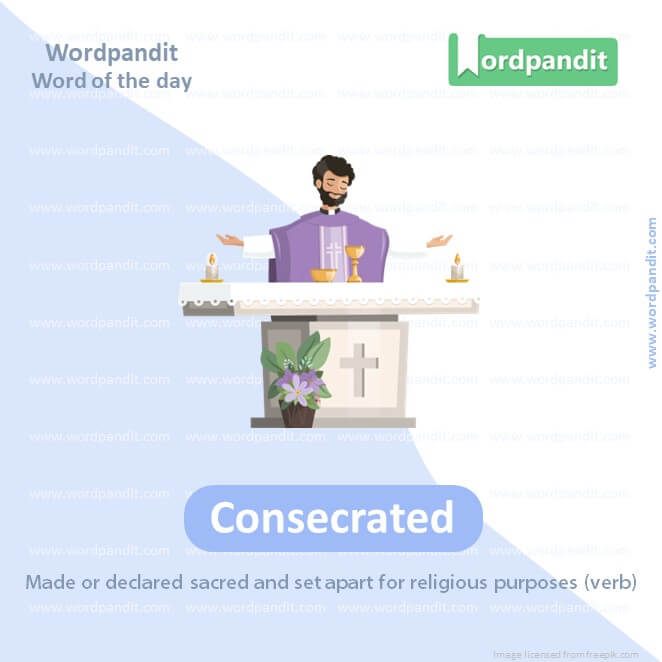
WORD-1: Consecrated
CONTEXT: It will be the moment when a temple was consecrated in Ayodhya… A political movement that began as a challenge to the ruling consensus, having made its way to the system’s centre
SOURCE: Indian Express
EXPLANATORY PARAGRAPH: Consecrated means something is made very special and important, often for religious reasons. It’s like when a place or a thing is given a special blessing so that it’s not just ordinary anymore.
MEANING: Made or declared sacred and set apart for religious purposes (verb).
PRONUNCIATION: KON-suh-kray-tid
SYNONYMS: Sanctified, Blessed, Hallowed, Dedicated, Sacralized
USAGE EXAMPLES:
1. The church was consecrated in a special ceremony.
2. The ground was consecrated for use as a cemetery.
3. The priest consecrated the water during the ritual.
4. The altar in the temple was consecrated.
WORD-2: Lampooned
CONTEXT: it is because I have been charged, lampooned and mocked for saying something I did not say.
SOURCE: Indian Express
EXPLANATORY PARAGRAPH: Lampooned means making fun of someone or something in a humorous way. It’s like drawing a funny cartoon of a teacher or writing a silly story that makes people laugh.
MEANING: Publicly criticized or ridiculed using humor, irony, or exaggeration (verb).
PRONUNCIATION: lam-POON-d
SYNONYMS: Satirized, Mocked, Parodied, Ridiculed, Caricatured
USAGE EXAMPLES:
1. The politician was lampooned in the latest comedy show.
2. The novel lampooned the social customs of the time.
3. He was famous for lampooning celebrities in his artwork.
4. The magazine often lampooned current events.
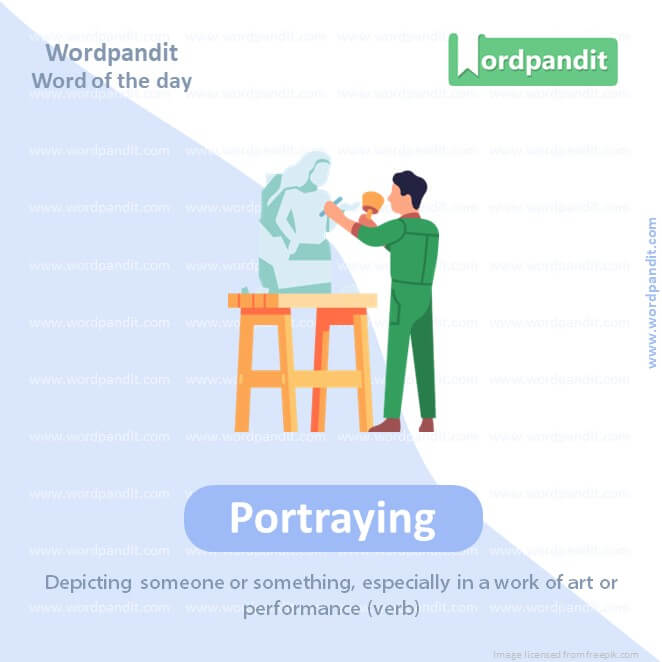
WORD-3: Portraying
CONTEXT: one of them is a famous website that survives on portraying itself as the arbiter of good journalism.
SOURCE: Indian Express
EXPLANATORY PARAGRAPH: Portraying is like showing or acting out something or someone. It’s like when you dress up and act like a character in a story or show a situation in a painting.
MEANING: Depicting someone or something, especially in a work of art or performance (verb).
PRONUNCIATION: por-TRAY-ing
SYNONYMS: Depicting, Representing, Illustrating, Mimicking, Enacting
USAGE EXAMPLES:
1. The actor received praise for portraying the historical figure.
2. The painting is known for portraying the beauty of the countryside.
3. She is skilled in portraying emotions through dance.
4. The book does a great job portraying life in the 18th century.
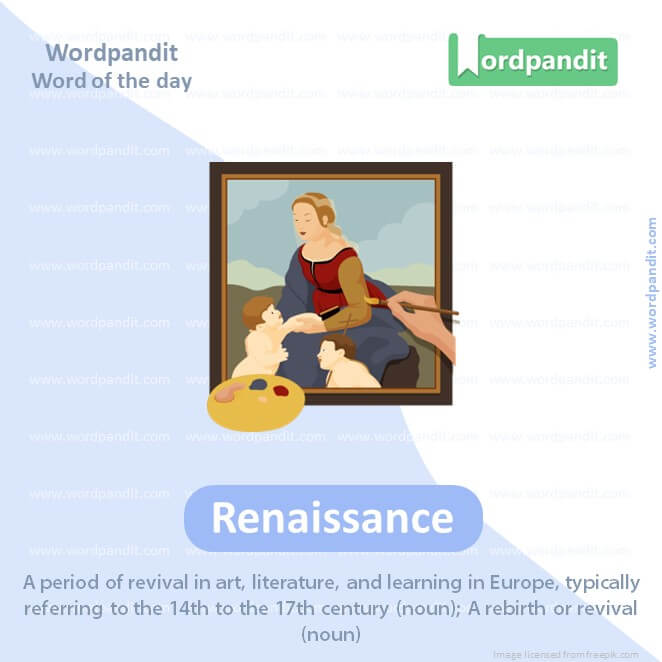
WORD-4: Renaissance
CONTEXT: it reviled me for declaring that the new temple in Ayodhya is the beginning of an Indian renaissance.
SOURCE: Indian Express
EXPLANATORY PARAGRAPH: Renaissance is a time in history, a long time ago, when people made lots of beautiful art, learned a lot, and made new discoveries. It’s like a period when everyone was super interested in creating and learning new things.
MEANING: A period of revival in art, literature, and learning in Europe, typically referring to the 14th to the 17th century (noun); A rebirth or revival (noun).
PRONUNCIATION: REN-uh-sahns
SYNONYMS: Revival, Rebirth, Renewal, Resurgence, Regeneration
USAGE EXAMPLES:
1. The Renaissance was an important era in European history.
2. His work is influenced by the art of the Renaissance.
3. There’s been a Renaissance in traditional crafts.
4. The city experienced a cultural Renaissance.
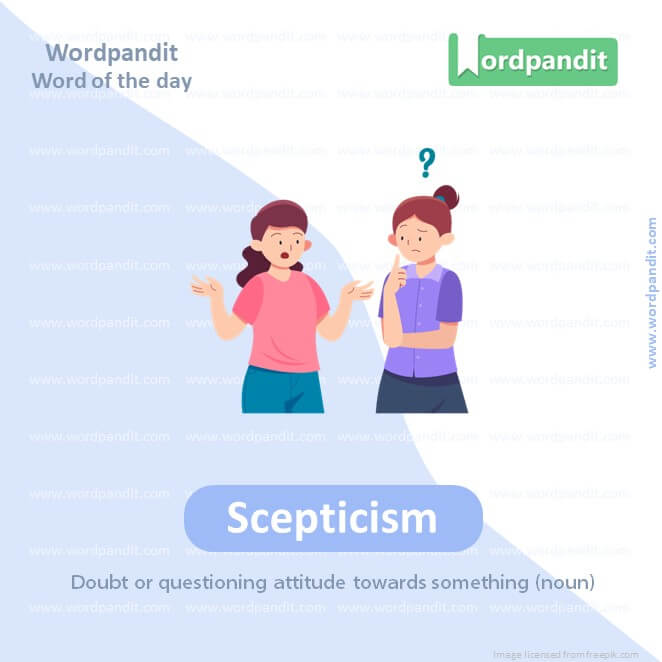
WORD-5: Scepticism
CONTEXT: those of us brought up on a healthy dose of scepticism towards overt displays of national symbols, this is perhaps the first time in our adult lives that spotting the Indian flag felt like an assurance.
SOURCE: Indian Express
EXPLANATORY PARAGRAPH: Scepticism is when you’re not sure if something is true or right. It’s like when someone tells you a story, and you think, “Hmm, is that really true?”
MEANING: Doubt or questioning attitude towards something (noun).
PRONUNCIATION: SKEP-ti-siz-uhm
SYNONYMS: Doubt, Disbelief, Uncertainty, Questioning, Mistrust
USAGE EXAMPLES:
1. His claims were met with scepticism.
2. She viewed the new theory with scepticism.
3. Scepticism about the project’s success grew.
4. He approached the rumor with healthy scepticism.
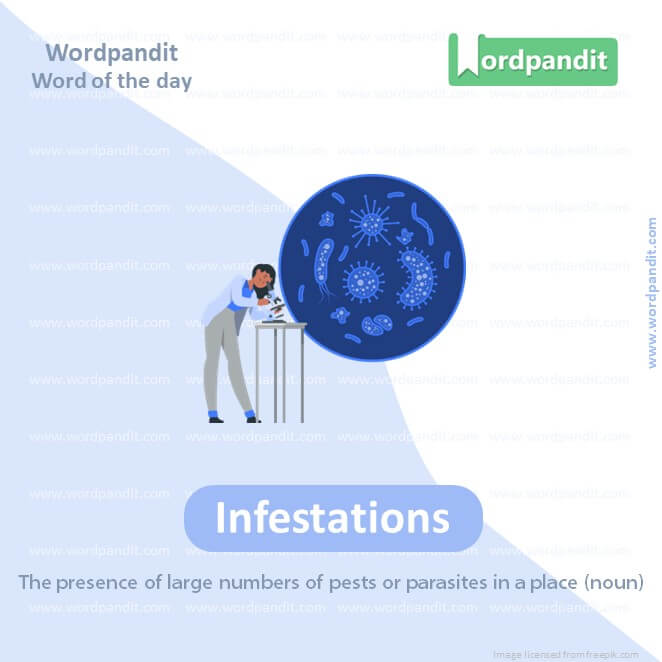
WORD-6: Infestations
CONTEXT: pylori or worm infestations can disturb the digestive system, leading to nutrient deficiencies.
SOURCE: Indian Express
EXPLANATORY PARAGRAPH: Infestations are when lots of unwanted animals or bugs come and live somewhere they shouldn’t. It’s like when ants get into the kitchen and are everywhere.
MEANING: The presence of large numbers of pests or parasites in a place (noun).
PRONUNCIATION: in-fes-TAY-shuhns
SYNONYMS: Invasions, Plagues, Swarms, Outbreaks, Infestations
USAGE EXAMPLES:
1. The house had an infestation of termites.
2. They had to deal with a rodent infestation.
3. The crop infestation threatened the harvest.
4. An infestation of locusts devastated the area.
WORD-7: Iodised
CONTEXT: The adoption of iodised salt under the National Iodine Deficiency Disorders Control Programme in 1992 significantly reduced goitre rates.
SOURCE: Indian Express
EXPLANATORY PARAGRAPH: Iodised is when iodine, a special kind of mineral, is added to something, like salt. It’s done to make the food healthier.
MEANING: Treated with iodine (verb).
PRONUNCIATION: EYE-uh-dyzed
SYNONYMS: Fortified, Enriched, Treated, Supplemented, Enhanced
USAGE EXAMPLES:
1. It’s important to use iodised salt for thyroid health.
2. The salt was iodised to prevent deficiencies.
3. Many countries have programs for iodised table salt.
4. She only buys iodised salt for her kitchen.
WORD-8: Fortification
CONTEXT: The country’s food fortification programme now includes adding micronutrients to staples such as wheat flour, rice, edible oils, and salt.
SOURCE: Indian Express
EXPLANATORY PARAGRAPH: Fortification is like building strong walls or defenses around something to protect it. It’s like making a fort out of pillows to keep safe from imaginary monsters.
MEANING: The act of strengthening or protecting something, especially against attacks (noun).
PRONUNCIATION: for-ti-fi-KAY-shuhn
SYNONYMS: Strengthening, Reinforcement, Defense, Protection, Consolidation
USAGE EXAMPLES:
1. The fortification of the castle took years.
2. They discussed the fortification of the city’s defenses.
3. The ancient fortification still stands today.
4. Nutritional fortification is added to some foods.
WORD-9: Stringent
CONTEXT: An important step in this direction is to inform the beneficiaries about the stringent standards of fortification.
SOURCE: Indian Express
EXPLANATORY PARAGRAPH: Stringent is like very strict rules or conditions that must be followed exactly. It’s like having a rule at home where you must clean your room every day, no exceptions.
MEANING: Very strict, precise, and exacting (adjective).
PRONUNCIATION: STRIN-jent
SYNONYMS: Strict, Rigorous, Tight, Severe, Harsh
USAGE EXAMPLES:
1. The company has stringent quality controls.
2. He was under stringent supervision.
3. The new laws are more stringent than the old ones.
4. They face stringent regulations in their industry.
WORD-10: Feasible
CONTEXT: it should be feasible in the real-life conditions and time available. Four, the material cost of the investigation should not be impossible.
SOURCE: Indian Express
EXPLANATORY PARAGRAPH: Feasible means something is possible to do and can be done without too much difficulty. It’s like when you think about climbing a small hill instead of a huge mountain.
MEANING: Possible to do easily or conveniently (adjective).
PRONUNCIATION: FEE-zuh-buhl
SYNONYMS: Possible, Doable, Achievable, Practical, Viable
USAGE EXAMPLES:
1. The plan seemed feasible and was approved.
2. It’s not feasible to travel at this time.
3. They were looking for a feasible solution.
4. The project’s feasibility is still being evaluated.
Vocabulary Importance
In the realm of language learning, understanding ‘vocabulary importance’ is a fundamental concept. Words are the building blocks of language and a rich vocabulary fuels effective and persuasive communication. However, embracing ‘vocabulary importance’ involves more than just acknowledging its role – it requires you to integrate it into your learning strategy.
To truly grasp ‘vocabulary importance’, expose yourself to a variety of reading and listening activities. Whether it’s reading novels, engaging with podcasts, or watching films in your the profound impact of having a robust vocabulary arsenal and will illuminate the practical ‘vocabulary importance.’
Additionally, recognizing ‘vocabulary importance’ necessitates an active approach to vocabulary acquisition. Regularly dedicate time to learning new words. Use flashcards, word lists, language apps, or even set a ‘word of the day’ to maintain a steady flow of vocabulary learning.
Incorporating the learnt vocabulary into your speech and writing is non-negotiable when understanding ‘vocabulary importance’. Regular usage not only enhances vocabulary retention, but it also uncovers the magic of eloquent expression that a blossoming vocabulary can yield.
It’s also beneficial to lean on memory aids in recognizing ‘vocabulary importance’. Associating words with images, stories or personal anecdotes creates strong memory hooks, enhancing vocabulary recall and solidifying the understanding of ‘vocabulary importance’.
To sum it up, ‘vocabulary importance’ is not just a theory to be noted, but a mantra to be embraced in your language learning journey. Engage with a wide variety of resources, actively learn and use new words, and utilize effective recall techniques. As you uncover the depths of ‘vocabulary importance’, you’ll realize that every new word is a fresh shade on your language palette, painting your communication canvas with hues of eloquence, clarity, and confidence.







